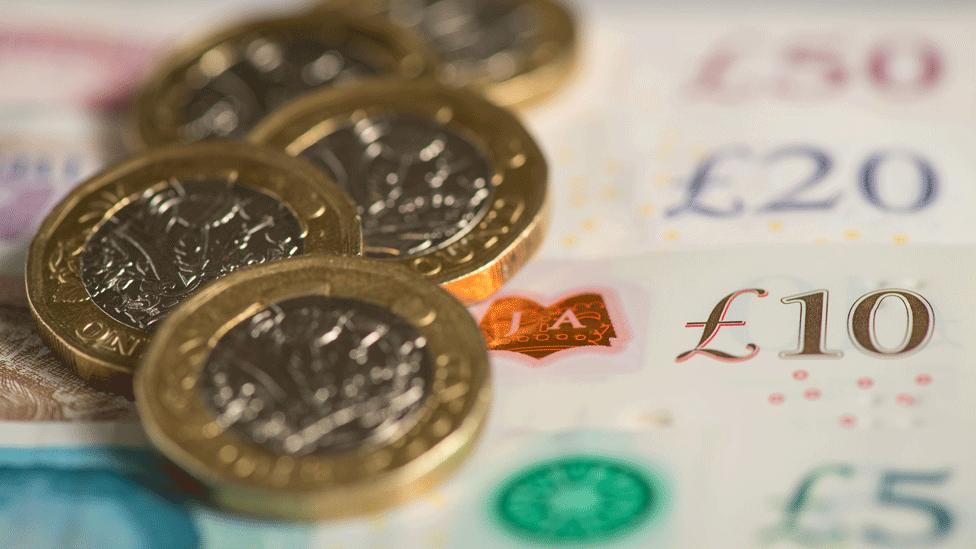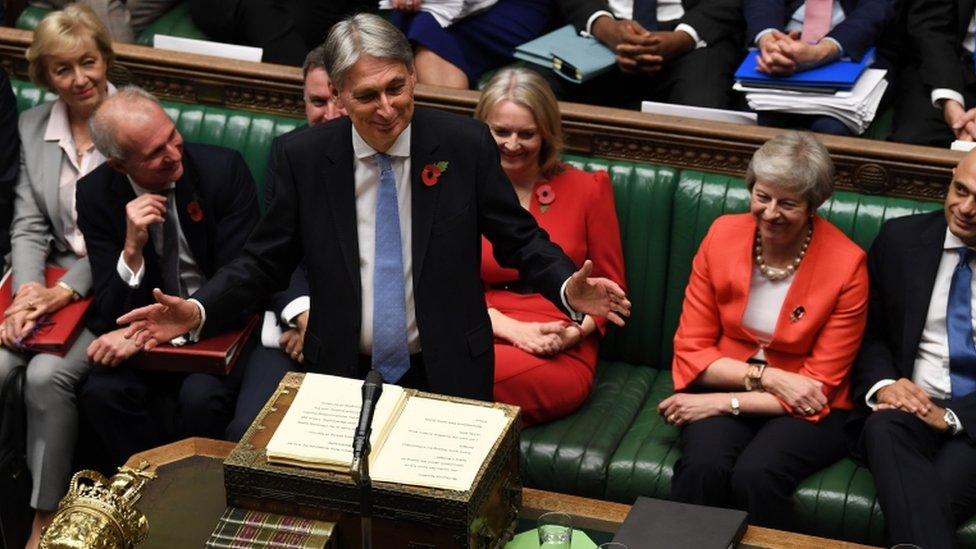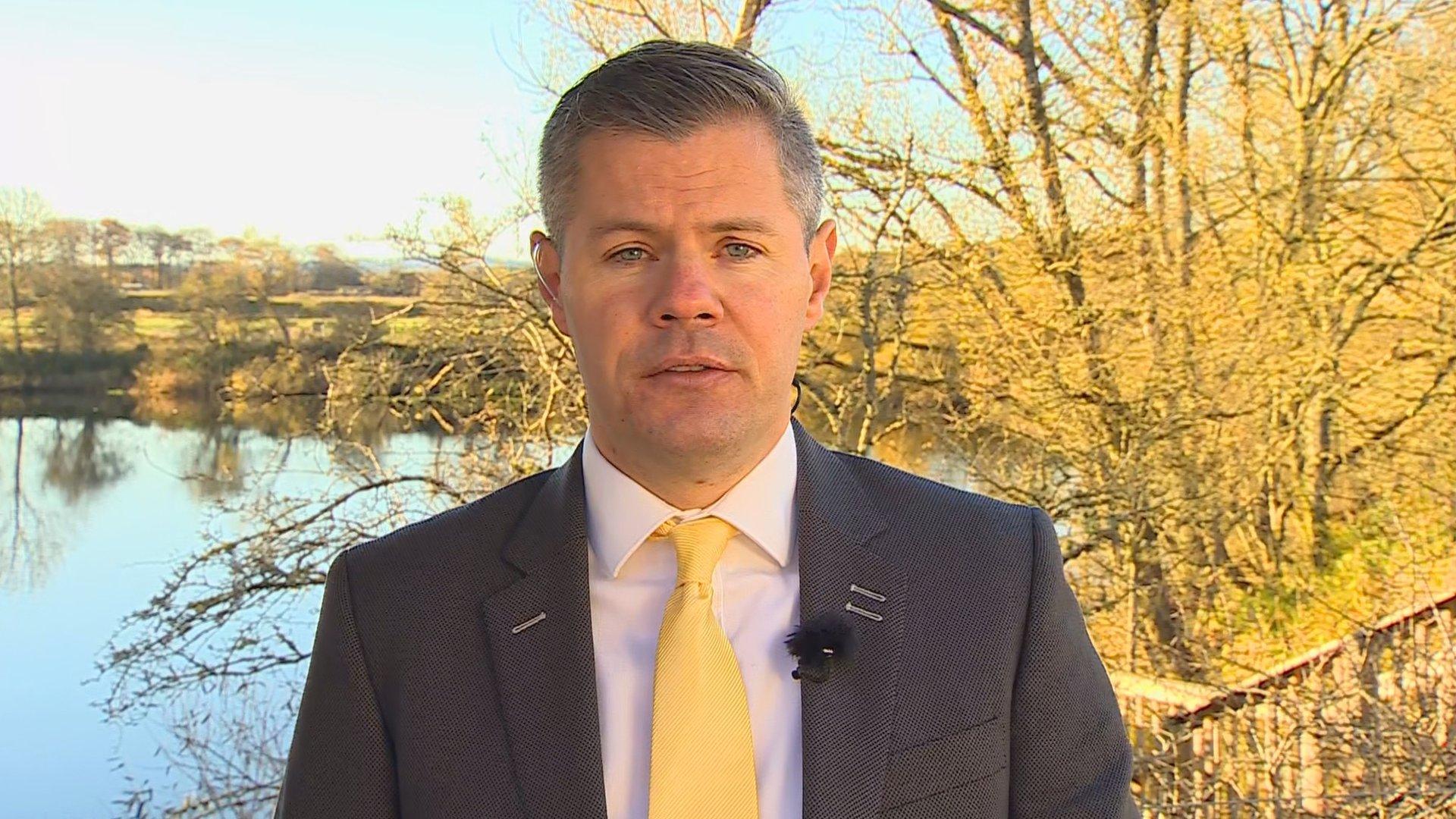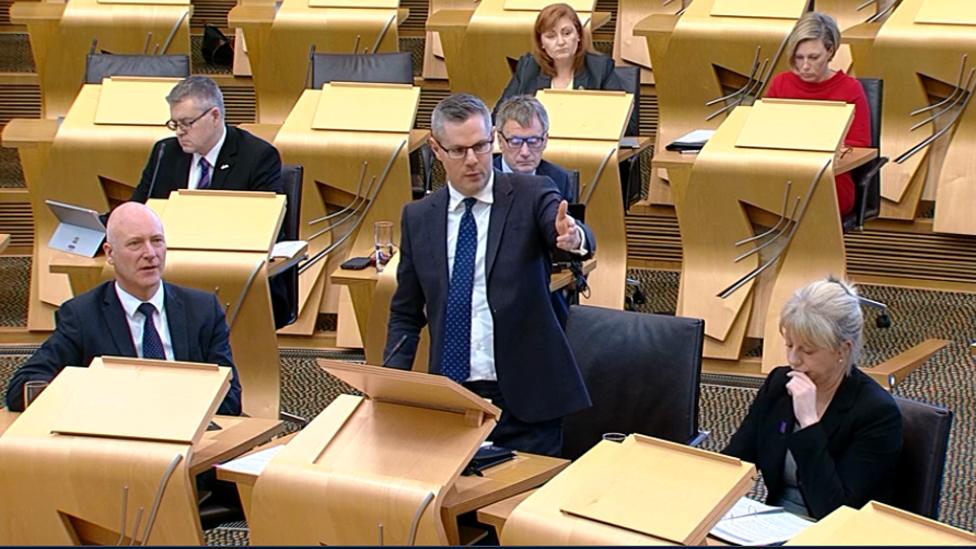Row over impact of UK Budget on Scotland
- Published

A row has broken out over the impact of the UK government's Budget on Scotland.
Chancellor Philip Hammond's latest set of tax and spending plans included a freeze on whisky duty and oil industry taxes, and an extra £950m for the Scottish government over three years.
However his Scottish counterpart Derek Mackay said the UK government had made a choice not to end austerity, and had "short-changed Scotland".
The Scottish government's draft budget plans will be set out in December.
Mr Hammond used his Budget - the last before the UK leaves the EU in March 2019 - to claim that "the era of austerity is finally coming to an end".
The Scottish government will get an extra £959.7m to spend over the next three years as a result of decisions made by Mr Hammond which cut across devolved areas - known as "Barnett consequentials".
Ministers at Holyrood get to choose how this cash is spent, although Health Secretary Jeane Freeman has already indicated that Barnett consequentials stemming from extra NHS funding in the rest of the UK will also be spent on health north of the border.
Other measures announced which will have a significant impact in Scotland include:
£150m for the Tay City Deal and negotiations for a Moray growth deal
whisky duty frozen
headline tax rates on the oil and gas industry maintained
£10m -UK-wide for fisheries technology
Mr Hammond claimed the freeze on whisky duty was due to "concerted lobbying" by the Scottish Conservatives, saying that "we can all afford to raise a wee dram to Ruth Davidson on the arrival of baby Finn".
And Scottish Secretary David Mundell said the budget was an "extensive investment in Scotland's economy", which "demonstrates clearly how the UK government is delivering for people in Scotland".
He said the bulk of the extra money for Scotland as a result of Barnett consequentials, would come next year, and suggested that Scottish ministers invest most of it in the NHS.

Philip Hammond used his Budget to claim that austerity was "coming to an end"
The Chancellor also announced that the tax-free allowance for income tax - which applies across the UK - will increase to £12,500 from April 2019.
He also announced a rise in the threshold of the higher rate of income tax, of 40p, to earnings above £50,000. In Scotland, the higher rate is 41p, and kicks in at £43,431 - meaning the divide between tax rates north and south of the border could increase if Mr Mackay does not take similar action in his draft budget.
'Short-changed Scotland'
In reaction, the Scottish finance secretary said that "austerity has not ended, and that is a choice by the UK government".
Mr Mackay said: "They could have done much more to stimulate the economy and invest in our public services, and they have chosen not to.
"I asked the Tories to 'show me the money' when they declared austerity was over - looking at their budget they have instead short-changed Scotland, and particularly the NHS.
"The Scottish government has already set out our plans to support the NHS in the years to come and the funding we have received as a result of health spending in England will go to our NHS in Scotland - but so far the UK government has fallen at least £50m short of what was promised only four months ago.
"The reality of today's budget is that Scotland continues to be hit by UK austerity and the decision to leave the EU."
Allow X content?
This article contains content provided by X. We ask for your permission before anything is loaded, as they may be using cookies and other technologies. You may want to read X’s cookie policy, external and privacy policy, external before accepting. To view this content choose ‘accept and continue’.

What has the reaction been?
The Scottish Chambers of Commerce said the Budget had been "largely positive for business communities across the country".
Chief executive Liz Cameron said that "businesses will now look ahead to ensure the UK government delivers a clear Brexit deal which enables them to plan and prepare".
The Chartered Institute of Taxation said the raising of the personal allowance could take thousands of Scots out of the income tax system altogether - potentially resulting in lost revenues for the Scottish government.
Moira Kelly, chairwoman of the group's Scottish Technical Committee, said the Budget "highlights the practical difficulties of having control over some, but not all, aspects of the income tax regime".
She said it was "unlikely" that Mr Mackay would match the higher rate threshold set for the rest of the UK, saying this might drive self-employed business owners to reorganise their tax arrangements to reduce their liabilities.
And Citizens Advice Scotland meanwhile said the Chancellor had conceded that there were "major problems" with Universal Credit, as he announced extra funding for those in receipt of benefits.
Chief executive Derek Mitchell said: "Any additional funding is of course welcome, but without more detail we are not convinced the amounts he has announced today will be sufficient to mitigate the very real hardships people are experiencing."

What are the other parties saying?
Scottish Labour said people would "see through" the government's claims about austerity coming to an end.
Leader Richard Leonard said: "Theresa May promised the people that austerity would end, but this budget has delivered nothing of the sort. While big business in the UK pay the lowest rates of corporation tax in the G7, low paid workers are struggling by on poverty pay, with a social security system that imposes a two child cap on tax credits."
Scottish Green co-convener Patrick Harvie said Mr Hammond had failed to heed warnings about "the urgency of tackling climate change".
He said: "We heard a chancellor obsessed with keeping taxes low on the oil and gas industry, aviation and on petrol sales. No one believes that token gestures such as limiting disposable coffee cup use will see us through this climate crisis."
Scottish Lib Dem leader Willie Rennie said the Chancellor had "neither ended austerity nor addressed the fundamental problems in the economy".
He said: "We needed a Budget that gave people fairer taxes and better public services, and a final say on the Brexit deal. Today, we got none of that."
- Published28 October 2018

- Published3 October 2018
